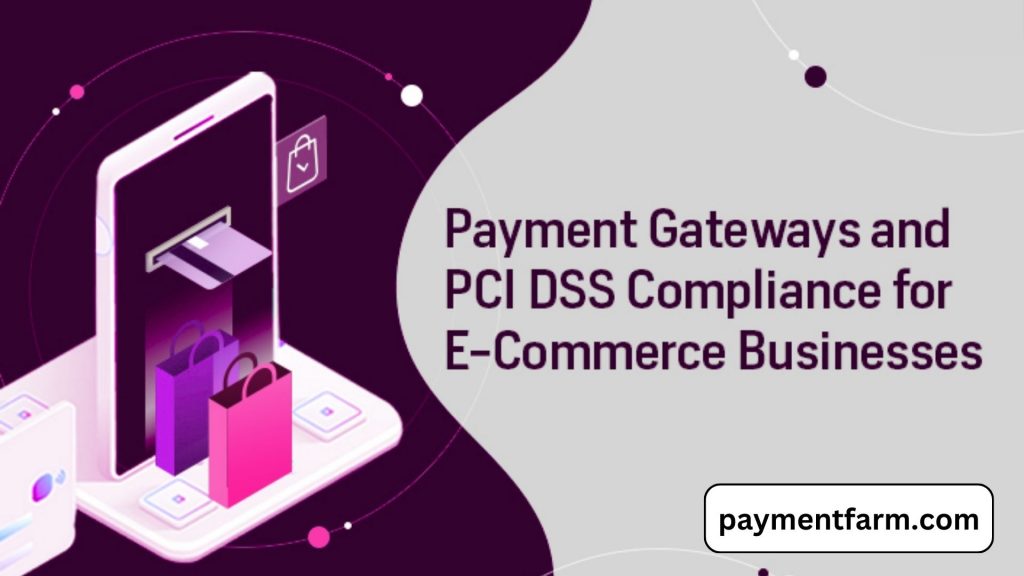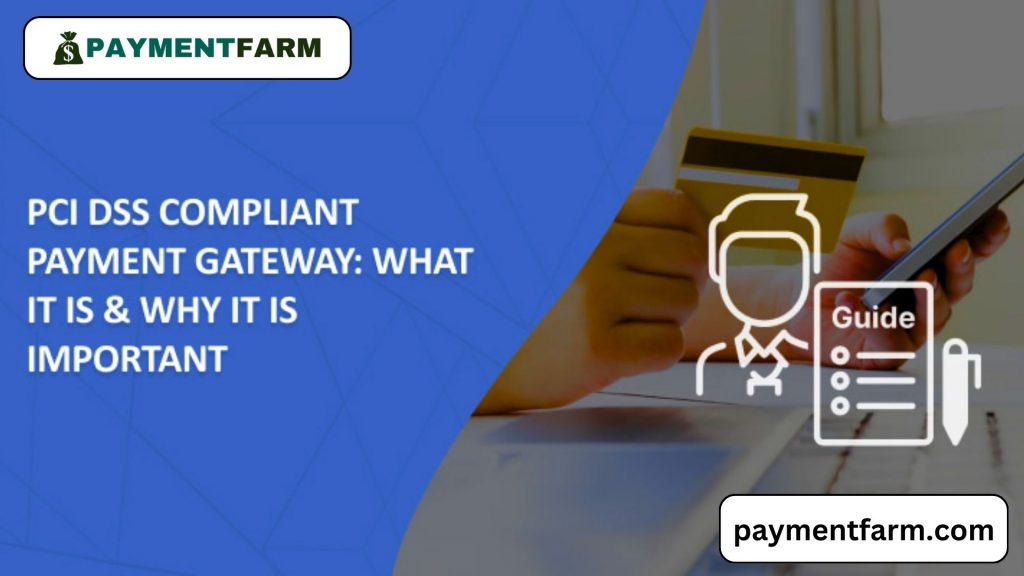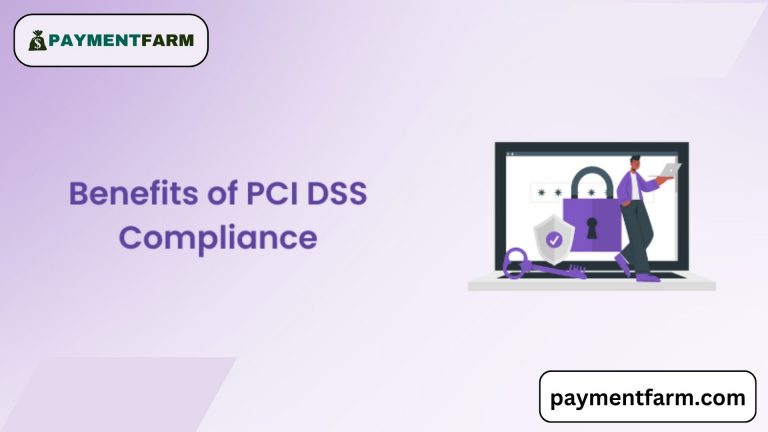To protect consumers from fraud, merchants, payment processors, and virtually all FinTech software providers that handle sensitive payment data are required to comply with the highly regulated PCI DSS (Payment Card Industry Data Security Standard) framework. This global security standard governs how cardholder data is stored, processed, and transmitted across the digital payments ecosystem

If you are looking for a secure way to accept payments on your website, your top priority should be choosing a PCI DSS–compliant payment gateway. Compliance ensures that customer payment information is protected against data breaches, fraud, and unauthorized access, while also helping businesses avoid costly penalties and reputational damage.
What is a PCI Compliant Payment Gateway?
Let’s dissect the idea of a PCI DSS compliant payment gateway into two parties in order to comprehend it. Let’s start by defining a payment gateway.By facilitating electronic transactions and sharing payment information between consumers, PCI-compliant payment processors, card networks, issuing banks, acquiring banks, and merchants, payment gateway software makes transaction processing possible while guaranteeing a safe and effective money transfer. In a nutshell, it is a technology layer that enables retailers to take consumer payments.Compliance with the Payment Card Industry Data Security Standard is commonly referred to as PCI DSS compliance. The Payment Card Industry Security Standards Council (PCI SSC) created this set of best practices and mandatory security standards to safeguard sensitive credit card and payment information for consumers both during and after transaction processing.
Let’s now integrate these two ideas.
Software or services that adhere to PCI DSS security standards and criteria are known as PCI compliant payment gateways. A payment gateway has put in place the required security procedures to protect sensitive card data if it is PCI DSS certified.
Being aware of the PCI DSS Requirements
Let’s examine a thorough set of standards and security measures PCI DSS offers to businesses handling payment card data in order to better grasp the importance of PCI compliance for payment gateways.
PCI DSS requirements have six basic elements that include:
- Establish and maintain a safe and sound system and network: To prevent illegal access and breaches, implement and update a firewall configuration to safeguard cardholder data.
- Protect Cardholder Information: Secure transmission of cardholder data by encrypting it before storing or transmitting it;
- Maintain a vulnerability program: Use and update antivirus software or programs regularly
- Implement strong access control measures: Limit access to cardholder data as much as possible in order to minimize the risk of illegal access and data disclosure.
- Regularly test and monitor networks: Monitor all network resources and access to cardholder data on an ongoing basis to help quickly identify suspicious activity.
- Validate PCI DSS Compliance: Renew PCI DSS compliance to determine annually whether your company still meets the security standards and requirements.
The Importance of PCI DSS Compliance
Compliance with PCI DSS is a must for all entities that deal with sensitive card information about customers. Now let’s explore why it’s critical in more detail.
- Legal obligations: Compliance with PCI DSS is not an option. You cannot opt to have it or not. There is a legal and regulatory necessity to process sensitive card data. For this reason, not following it exposes you to significant penalties, fines, and legal ramifications. Fines for non-compliance could be as low as a few thousand dollars or might reach figures in the multiple hundreds of thousands. Therefore, organizations can play their legal obligations in order to avoid hefty fines and be compliant with PCI DSS.
- Security of data: Fraudulent conduct is another danger that worries merchants. Your software won’t probably protect cardholder data on your website if it isn’t PCI DSS compliant. There may be serious repercussions, such as irreversible harm to one’s reputation or monetary loss. The precise protection of sensitive cardholder data is the core of PCI DSS certification. Compliance guarantees that strong security procedures are in place to protect sensitive customer data from theft, breaches, and unauthorized access.
- Saving of money: Saving hundreds of thousands of dollars on fines, legal fees and costs associated with security enhancements, policy improvements, and compliance efforts to prevent future incidents will be realized by businesses as PCI DSS significantly lowers the chance that data breaches will occur in the first place.
- Management of reputation: To protect both themselves and their clients, companies need to protect their reputation, which holds a very high and important value. Without that measure, the organization’s future and long-term reputation may be badly damaged, while customer trust will also be lost for good. This is exactly where PCI DSS comes in-safeguarding fraud from occurring and damaging your brand.
- Customer Trust: Every time a customer wants to purchase something on a website, he will first be considering how safe it would be to provide payment details. Customers see firms who adhere to PCI DSS as safe firms, which motivates them into making a purchase on your site knowing that credit card information will be safe and secure.
How a PCI DSS Card Payment Gateways Works
Through the encryption and transmission of a customer’s card information, authorization from the issuing bank, and secure payment processing, a PCI DSS compliant payment gateway enables safe online transactions.The PCI DSS compliant payment gateway keeps a high level of security throughout the process, guaranteeing that sensitive client data is safeguarded at every stage of transaction processing.

In order to further improve security, it might also provide further technologies to shield consumers from fraud, like tokenization (which substitutes randomly generated tokens for genuine card data).Payment gateways go through yearly audits and assessments to ensure they are adhering to security standards in order to retain PCI DSS compliance.
Trusted PCI DSS Gateways Europe
- Stripe
- Adyen
- PayPal (Braintree)
- Worldpay
- Klarna
- Checkout.com
- Mollie
- Sage Pay (now Opayo)
- Authorize.Net (EU version)
- 2Checkout (now Verifone)
PCI DSS certified processors Europe
- Adyen
- Worldline
- Ingenico
- Stripe
- PayPal
- Klarna
- Checkout.com
- Nexi Group
- Elavon
- Payoneer
High-Risk Payment Gateways PCI DSS
High-risk companies are often subject to increased scrutiny when selecting payment gateways, particularly when it comes to PCI DSS compliance. Because these businesses operate in industries with higher fraud and chargeback exposure, they require payment gateways specifically designed to meet stricter security and risk management standards. High-risk payment gateways focus on supporting industries such as forex trading, adult entertainment, online gambling, gaming, and other regulated sectors, while ensuring full PCI DSS compliance.
Below are several well-known PCI DSS–compliant high-risk payment gateways that provide secure and reliable payment processing solutions:
PaySpace – Specializes in high-risk industries and offers advanced fraud prevention tools to help minimize chargebacks and unauthorized transactions.
EMB (eMerchantBroker) – Focuses heavily on high-risk merchants, particularly those in adult entertainment and other challenging verticals, with tailored risk management and compliance support.
Ikajo – Provides global, multi-currency payment processing solutions for high-risk businesses, making it suitable for merchants with international customer bases.
PayOp – Known for smooth integration, flexible APIs, and PCI DSS–compliant payment processing for high-risk merchants seeking scalability.
SecurePay – Recognized for supporting high-risk sectors with built-in anti-fraud measures and strong security infrastructure.
PaymentCloud – Offers customized payment solutions and dependable PCI DSS compliance for a wide range of high-risk verticals.
Allied Cash – Trusted for both high-risk merchant accounts and its international processing capabilities, serving businesses across multiple regions.
Merchant Services Durango – Delivers tailored payment solutions for high-risk companies, ensuring PCI DSS compliance through customized onboarding and ongoing support.
PCI DSS standards for merchants
- Safe Network: Use a firewall and strong passwords to make sure the network is safe.
- Protect Data: Encrypt transfers; do not retain CVV numbers.
- Monitor Systems: Update software and use antivirus software to monitor systems.
- Access Control: Limit access to cardholder data for access to whom it is necessary for an individual to know.
- Effective Testing: Obtain through penetration testing and vulnerability scanning.
- Policy Management: Have a policy regarding information security.
How to comply with PCI DSS
- Understand Your Merchant Level: Based on the number of your transactions, determine the compliance needs.
- Final Appraisals: Use a Qualified Security Assessor (QSA) or complete the Self-Assessment Questionnaire (SAQ).
- Protect Cardholder Information: Make use of firewalls, encrypt data, and avoid default passwords.
- Limit Access: Conduct the minimum people who can use unique IDs and access card details.
- Test Often: Do penetration testing and vulnerability scans.
- Make Use of PCI-Compliant Vendors: Team up with approved payment processors.
- Train Employees: Educate the employees on the security processes.
- Send in reports: File SAQs, Reports on Compliance (ROC), and scan findings when required.
To guarantee the security of the PCI DSS network
To ensure PCI DSS network security:
- Modify the default settings: On devices, create strong, one-of-a-kind passwords.
- Encrypt Information: Use robust encryption (such as TLS) to protect cardholder data while it’s in transit.
- Systems for patches: Update network equipment and software on a regular basis.
- Limit Access: Limit access to sensitive locations and divide networks into segments.
- Track Activity: To find questionable activities, log and examine network traffic.
- Test Frequently: Every year, conduct penetration testing and vulnerability scans.
Benefits of PCI DSS compliance
Online retailers and companies of all sizes can profit from a PCI DSS compliant payment gateway in a number of ways. These include:

- Compliance with laws and regulations: PCI DSS-compliant payment gateways assist companies in fulfilling legal and regulatory obligations regarding data security. Using a payment gateway to leverage PCI compliance ensures that the business complies with relevant rules and regulations, preventing any legal ramifications that may arise from non-compliance.
- Advanced system security: Strict adherence to rules and regulations intended to protect consumers from fraudulent activity is ensured by the PCI payment gateway’s cutting-edge technologies for safely handling and storing sensitive card data.
- International growth: Many nations throughout the world have adopted and acknowledged PCI DSS standards and requirements. Because they adhere to established security requirements, merchants using compliant software can confidently grow their customer base and accept transactions from all over the world.
- Simplified handling of transactions: Payment gateways that are PCI compliant offer high levels of efficiency. In order to guarantee a smooth and rapid checkout procedure, they are made to handle transactions swiftly and securely, reducing delays in payment authorization and processing.
- A satisfying experience for customers: Customers enjoy a simple and safe transaction procedure that protects them from fraudulent activity when they make a purchase on a website that uses a PCI DSS certified payment gateway. This satisfying experience encourages repeat business by strengthening customer loyalty to the retailer.
Payment Gateway PCI DSS certification level
There are four levels of PCI DSS certification because businesses that handle credit card transactions vary in size and complexity. The quantity of transactions processed each year determines these levels.
PCI DSS Level 1 payment provider: more than 6 million transactions annually
Level 2: one million to six million transactions annually
Level 3: 20,000–1,000,000 transactions annually
Level 4: fewer than 20,000 annual transactions
To sum up
A payment gateway that complies with the Payment Card Industry Data Security Standard (PCI DSS) is a safe technology that allows businesses to handle credit card payments while protecting sensitive consumer information. This compliance entails putting security measures in place to safeguard cardholder data and stop fraud, such as firewalls, access control, encryption, and routine testing. PCI DSS-compliant gateways are essential for companies that conduct business online because they protect financial information, keep customers safe, and help them avoid legal repercussions. In order to comply with PCI DSS regulations, which are crucial for protecting data and expanding globally, firms must choose from four compliance levels that are based on transaction volume
Faqs
What Is PCI Compliance?
Following the Payment Card Industry Data Security Standard (PCI DSS), a collection of security regulations intended to safeguard cardholder information during transactions, is known as PCI compliance. Businesses that handle credit card information are guaranteed to have strong security measures in place to protect sensitive data from breaches or misuse thanks to PCI compliance.
What Is a PCI-Compliant Payment Gateway?
A payment processing system that complies with the Payment Card Industry Data Security Standard (PCI DSS) is known as a PCI-compliant payment gateway. This compliance guarantees that the gateway satisfies the security requirements needed to handle, process, and transmit credit card data securely.
Do I Still Need to Be PCI Compliant If I Use a Payment Gateway?
Yes, even if you utilize a payment gateway, you still need to make sure that you are in compliance with PCI. The company that handles payments may also be held accountable for compliance, even while the payment gateway itself complies with PCI, which means it adheres to the necessary security standards.
How can I confirm that I am in compliance with PCI?
Learn about the PCI DSS and evaluate your company’s credit card data handling practices to guarantee PCI compliance. Verify that your payment gateway complies with PCI, and if necessary, finish a formal audit or the Self-Assessment Questionnaire (SAQ).Put security measures in place including network protection, access control, and data encryption, and keep an eye out for weaknesses on a frequent basis. Maintain records of your compliance initiatives for future security management and audits.
How can a business ensure PCI DSS compliance?
Businesses can ensure compliance by:
Using a PCI DSS-certified payment gateway.
Regularly testing and monitoring their networks.
Encrypting sensitive data.
Limiting access to cardholder information.
Completing the required Self-Assessment Questionnaire (SAQ) or audits.
If I use a PCI-compliant payment gateway, am I automatically PCI compliant?
No, while using a compliant gateway reduces risk, businesses are still responsible for their own PCI DSS compliance. They must ensure their operations and systems also meet the required security standards.
What happens if my business is not PCI compliant?
Non-compliance can lead to penalties, legal consequences, reputational damage, and potential data breaches, which could incur significant costs and loss of customer trust.
What are some examples of PCI DSS-certified payment gateways?
Trusted PCI DSS-certified gateways include Stripe, PayPal, Adyen, Worldpay, and Checkout.com, among others. These providers comply with stringent security standards to ensure safe transactions.
What is the role of tokenization in PCI compliance?
Tokenization replaces sensitive card data with randomly generated tokens, reducing the risk of exposure during transactions. It’s a key feature in PCI DSS-compliant systems to enhance data security.
How do high-risk industries manage PCI DSS compliance?
High-risk businesses, like online gambling or forex trading, use specialized PCI-compliant gateways (e.g., PaySpace, EMB) that cater to their unique needs. These gateways often include advanced fraud prevention tools and support for multi-currency transactions.
